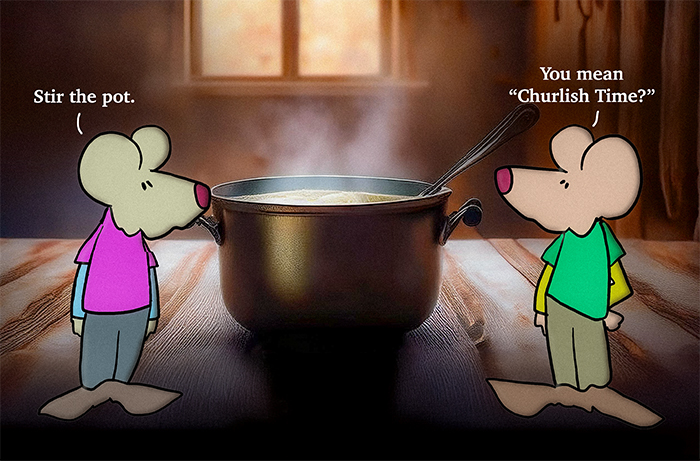“She found his churlish remarks during the meeting to be completely unprofessional and unnecessary.”
Well, I don’t know who she is. Or him, either. Let’s just call them Freda and Bernard. Their imaginary characters live in the dictionary under the word “churlish.” They stand there, day in and day out, on those pages, in that meeting. And every time, Freda finds Bernard’s remarks to be utterly churlish.
If you opened the dictionary five years ago, they were there. Fast forward to five years from now, and they’ll still be there, with Bernard being as churlish as ever. It is their lives’ destinies.
I only know this because churlish is one of those words that always strikes me when I hear it. And I have to go read the definition from time to time just to know I have it all right.
To me, churlish sounds like one of two things. Either “girlish.” For obvious rhyming reasons.
Or it sounds like a word to describe the process of stirring something. I suppose, like churning it, maybe. But not like butter. Churlish is more liquid, I’d say.
Anyway, I looked it up this morning, once again, and it still said that churlish is an adjective.
And the definitions go like this:
1 : of, resembling, or characteristic of a churl: vulgar
2 : marked by a lack of civility or graciousness : surly
3 : difficult to work with or deal with : intractable
I’ve met a few churlish people in my life. Frankly, I don’t care for the attribute.
It seems churlish people have been around for a long time. The history of “churlish” goes back to Anglo-Saxon England.
You see, it is easy to understand how churlish has come to mean “vulgar,” “surly,” and “intractable”—if you know your English history.
In Anglo-Saxon England, a churl, or ceorl, was a freeman of the lowest rank who owned and cultivated a small farm. He had certain rights. But he also had upward mobility to rise through the ranks. He could become something called a “thane.”
After the Norman Conquest (SIDEBAR: The Norman Conquest refers to the period in 1066 when William the Conqueror, Duke of Normandy, successfully invaded England and claimed the English throne. This event drastically changed the course of English history. END of SIDEBAR).
Anyway. After the whole Norman Conquest thing, many churls became serfs. This change in status meant losing social mobility. But it also meant losing geographical mobility as well. The churls were demoted. And as such? The lowest rungs of a social system often caused people to swear like drunken sailors, and churl eventually came to be used as a term for a rude, ill-bred person.
You know. Boorish, classless, cloddish, loutish, uncouth. Churlish.
But. It definitely doesn’t mean “girlish.” And it does not define the act of stirring something. No matter how my little brain sees the word.
So today, and every day, I will try not to be churlish.
If I have to stir my grits, I’ll use some other method.
“””””””””
“Rudeness is the weak man’s imitation of strength.” — Eric Hoffer
“””””””””
“The way you treat people is a reflection of how you feel about yourself.” — Robert Gordon
“””””””””
“The foolish and wicked practice of profane cursing and swearing is a vice so mean and low that every person of sense and character detests and despises it.” — George Washington
“”””””””””””””
It is not stirring. Not girly girl either.
